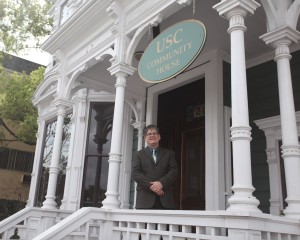North-Hager works toward University Park Family
When people discuss the University Park area, they sometimes disparage the “University of South Central” as an unsafe urban environment stricken with high crime rates.
Eddie North-Hager, associate director of media relations, works to counter this stereotype that he said comes from major news outlets’ scant coverage of South Los Angeles by providing a place to showcase local news.

Community · Eddie North-Hager, associate director of media relations, has created the website UniversityParkFamily.com to reverse stereotypes about South Central. - Jessica Badrous | Daily Trojan
“So often in our neighborhood, the press only covers things when they’re newsworthy enough for the whole city, which is usually crime,” North-Hager said. “Crime in this area has been reduced drastically since 2001, but we still have this feeling that it’s of epidemic proportions.”
North-Hager created the website UniversityParkFamily.com in 2009 to allow community members to act as citizen journalists by sharing news and upcoming events specific to the University Park area. He calls it part news, part social networking.
“Facebook focuses on yourself or your circle of friends,” North-Hager said. “University Park Family focuses on the neighborhood, and it involves the neighborhood to focus on the one thing they have in common, which is their geographic location.”
University Park Family, which has about 500 members, goes beyond the interests of USC students. Instead, it is a place for community members, who make up more than half of users, to connect by sharing information others might have never found.
North-Hager began working for USC media relations six years ago, around the same time he moved to Leimert Park and created LeimertParkBeat.com, the first of several websites like University Park Family.
“People choose to live here because they love the area, but being involved can be really hard,” North-Hager said. “I was new to the area, and I didn’t want to be an authoritative voice in their lives, rather I wanted us to be able to share everybody’s strength in a central place.”
North-Hager said his own experience as a community journalist showed him the value of allowing members of the community to act as citizen journalists themselves.
He grew up in Tucson, Ariz., where he began working for the local newspaper while in high school and got a bachelor’s degree in journalism from the University of Arizona. His first full-time job was with the Idaho Press Tribune as a community reporter, in a town he said was much smaller than the University Park area.
“At one time, most large neighborhoods had some kind of a personal news outlet,” he said. “I think that most of them could use one today too.”
He was working for the Daily Breeze in the South Bay when he made the switch from reporting to public relations in 2006 because of his worries about the future of daily newspapers.
While North-Hager recognizes that many journalists see making the transition to public relations as “going to the dark side,” he said his job at USC has never made him question his values, but rather has allowed him to use skills he learned from his years as a reporter.
“I haven’t bent my principles as a media relations person once,” he said. “As a good press release, you’re not there to write it, you’re there to report it. You have to put out the news very quickly and at a level a 10th-grader would understand.”
One of the benefits of his transition was the opportunity to further his education at USC. He said each semester the university provides one tuition-free class to employees. North-Hager used his free classes toward his masters in communication management. For his final project in 2009, he and his team created another similar website for Echo Park, and during the past few years, he has created websites for Rancho Park, San Pedro and Culver City.
Now, North-Hager uses his knowledge of USC to enhance the University Park experience for all users. He frequently posts information that most USC students hear about, such as street closures affecting regular traffic, that community members might not see until they happen.
Because of his work with the community, he was asked to join the neighborhood commission, something his boss encouraged.
“At USC, we want to give you the tools to be a great person and that doesn’t just mean make money,” he said. “We want you to be part of the community.”
